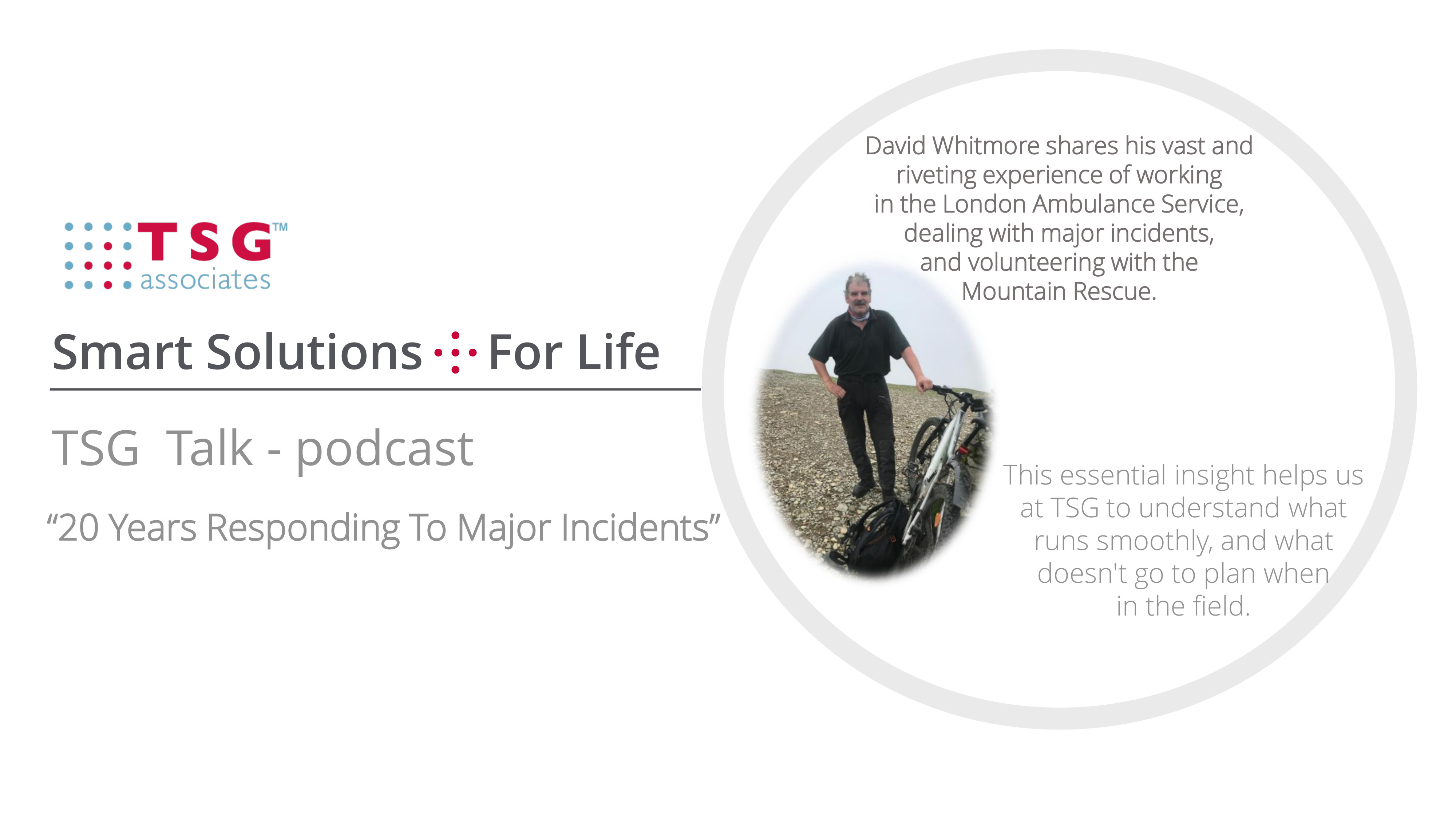


17/12/2021
TSG Talk – Lessons from a career responding to major incidents
In a recent episode of our podcast TSG Talk, Senior Partner Colin Smart engaged in a conversation with Dave Whitmore, formerly of the London Ambulance Service, a renowned expert in pre-hospital care and major incident response.
Background
Dave first shares insights into his extensive career journey.
“I joined the London ambulance service on the 15th of September 1980. So 41 years ago nearly. I was stationed initially having done my initial miller training. So 6 weeks and then off you went, got stationed at Camden and then at St. John's Wood. I then took a career in school, education, and training, but mainly worked in London for the majority of my NHS career. I also spent some time in the West Country Services from 2000 for a couple of years as head of education development down there. Then following a family agreement, I moved back up to Staffordshire, but stayed working and actually went back to London.”
He also described his current role within the Peak District Mountain Organisation Medical Group.
“I suppose, is also I've been working in the search and rescue field, mountain rescue, as of right now, 21 years. I started on one of the Dartmouth teams, Tavistock. And then when I moved up to the Peak District, I've now joined the Derby team and I chair the Medical Group of the Peak District, mountain organisations. That's seven mountain teams and one cave rescue team. I must stress, that I'm not a caver, you will not get me down deep dark holes.”
Dave then recounted his experiences with major incidents, both his first and last MCI.
“I suppose in terms of mass casualties, the very first one I dealt with was a fire. You know, it was a cul-de-sac. It's literally just to the north of Hyde Park, near Paddington. Sadly, 8 people died that night, and many, many more burned and injured. And then, my last operational day in the NHS Ambulance service was actually the 22nd of March 2017. People remember that particular day for the Westminster Bridge attack, where 4 people were fatally wounded. I forget the exact numbers, but approximately 50 other people were wounded and injured.”
Importance of communications
He then underscores the critical role of effective communication in responding to major incidents.
“Yeah. I mean, airwaves and digital systems, they're progressing, they're gonna develop and I am hoping it will become a new technology that comes on stream with coms. It is going to get better. What I think worries me is if we get a deliberate attempt to interrupt our comms, I think it's one of those things we have to think the unthinkable. If someone had said to me on the 7th of July in 2005, you're gonna have 4 suicide bombers all at once. We have to think the unthinkable and plan for that.”
Furthermore, Dave highlighted the challenges stemming from a lack of mutual understanding among different agencies and first responders and their capabilities.
“It's definitely in trouble I think. Had you asked me that question, say probably 15 years ago, I'd probably said maybe no. But I think if you asked me that question now, fire service, police, ambulance, hospitals, coast guard. We used the terminology in mountain rescue, so there is that commonality to make sure it carries on. I think with that commonality of language, there also needs to come an understanding of what each agency can do, we know what the police service can do, what the fire service can do, we know the ambulance service, and then ourselves.”
He continues, explaining the importance of frontline members' knowledge of this.
“We have to again, bear in mind, that the first people who respond to these incidents; it's going to be your frontline operational staff who may not understand fully what the fire service can bring to the party or the police service, It’s going to be your paramedics on the road, your first fire crew on scene, your first police officers on scene. And we need to let all strata of the organisations know and understand what we can all do because it’s not going to be the senior managers on the scene from the off.”
Dave then talks about the importance of clear communication.
“If you don't need to say something, just don't say it. But if you do need to say something, then say it. Speak up and say it, and I think in exercises, you could run a tabletop exercise. Just on the radio side of it to really get this point home. If you don't need to say something, for God's sake, don't say it. If you do, cut through the chitchat and say priority, I need to say it.”
Take your time to think
He then describes how it is important to plan before taking action.
“The police search advisors, they initially have to process huge amounts of information before they ever really press the button to say we need teams out there searching. They are taking that critical time to process information. Yes, time is ticking away by the second, but they are taking that critical time to process information. Make their plan and then get things going, and that works. So I think if all of us learn from looking at how people do other things that you think well, what's missing?…”
Why kit practice is essential
He then explains how MCIs are rare and that the attendees are not experts in this field.
“And this is what, once or twice in our career, we will attend to this. So we have to understand the people who are attending. Although they're experts, ambulance practitioners are not experts in major incident response. And I think understanding that adjusts how we try to help these people respond. I think that's quite important.”
He then remarks on how the triage tags help with this aspect.
“I think this is where the design of the triage tags is so useful because they are easy to use. But what you need to do if you have a bit of downtime, is have a pack on station that can be open and can be used. So you can just sit there having a cup of coffee and just say make them to P2, make that into P1. I used to encourage people to use some of this equipment for some of the larger-scale RTCs. Just get some of this kit out and just use it so that when you really need it, you're not fumbling around. Oh God, how does this blasted tag fold? And then saying, “Oh, they don't work.” Well, I'm sorry. Those tags work. I've used it along with my colleagues. I've used lots of those over the years. They work, but what you need to do is you need to practise with them. I don't want to single out the directors of finance, “But yeah, this is expensive I'm afraid.” We have got to prepare for this and we have to spend money on it. But we also need to allow our staff time to exercise for this.”
What advice would you give our listeners?
Dave then shared his advice on how he would advise colleagues to prepare for the future.
“Go back and look at previous incidents. Look at the big RTC that may have had one fatality but other things were going on. Look at those, learn from those, from looking at the big incidents. Know what problem sights you have got in your locality. If you have some problems sights, do think about them; how would they affect people? What would I do? Use your recurring big events, like New Year’s Eve festivals. Use those as a training area for your junior staff. Get them to take command and control.
Find out more
Click here to listen to the full TSG Talk episode with Dave Whitmore, and to find out more about our life-saving solutions then please contact TSG Associates on 01422 557841 or email us at info@tsgassociates.



%202.png)






